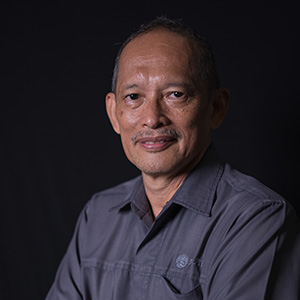
Prof. Dr. Ir. Adi Surjosatyo, M.Eng.
adisur@eng.ui.ac.id
Educational Background
1986 – Mechanical Engineering, Universitas Indonesia
1997 – Mechanical Enginering Universitas Teknologi Malaysia
2000 – Mechanical Enginering Universitas Teknologi Malaysia
The world’s oil reserves are quickly running out, and, at the same time, environmental problems have increased due to the burning of fossil fuels. The world needs renewable sources of energy as a solution to those problems. Thus, ideas of research on power generation through Biomass Gasification Technology, Waste to Energy, and Wind Turbines have come to mind.
Biomass Gasification
Biomass gasification is the process of breaking down biomass into combustible gases, non-combustible gases, and other particles such as ash and/or tar. One of the researches on the procurement of alternative sources of electrical energy is the use of biomass fuels or agricultural solid waste largely abundant in Indonesia. This could be a huge alternative potential source of energy. The heat that is produced is optimal and the level of pollution is low. It is environmentally-friendly for a coastal community to take advantage of biowastes such as rice husks and wood as a source of renewable energy to generate electricity.
The gasification process reduces air pollution combustion waste is not directly discharged to the environment; however, it is discharged through a cleaning process. Prof. Adi hopes that the results of this research will be useful for the development of a renewable source of biomass energy in Indonesia. Currently, mobile biomass gasification is being developed on a micro-scale (10 kW) in collaboration with several industrial partners such as PT Melu Bangun Wiweka. Subsequently, it will be produced (within the industry and environmental standards) to be commercialized with the technological readiness level (TKT) targeted at level 7.
Waste to Energy
Waste to Energy is a technology employed to convert waste to energy focused on utilizing municipal waste. Municipal waste is a major problem in Indonesia, especially in a big city like Jakarta. There are two main studies on this topic namely feedstock treatment and hydrothermal to carbonization (HTC). Feedstock treatment is aimed at increasing the added values of the waste by a pelletizing treatment with the shape, composition, and pressure of certain dies to produce quality waste pellets.
On the other hand, HTC is a process of converting non-metal and non-glass municipal waste into biochar that can be used as renewable solid fuel. HTC can handle almost all types of garbage in a landfill, thus effectively converting municipal waste.
Wind Power
The research on the potential energy of Windmills as a new source of renewable energy in the ecotourism area of Kampung Bungin, a coastal area in the regency of Bekasi, where most of the people there lived as fishermen were conducted. That windmill building was part of Problem-Based Community Engagement Grants (CEGs) programs or UI Community Service Programs.
That wind power generation system has a 500-Watt capacity. The Windmill had a 9-meter-tall tower divided into 6 sections to facilitate mobilization and use a solid foundation. That generating system would start to generate electricity at a 3-m/s speed (Cut-in Speed) and would stop generating electricity for the system’s safety at a 12-m/s speed. The generator that was used was a Synchronous Permanent Magnet Generator (SPMG) type with a 500-Watt capacity with a 24VAC 3-Phase. Currently, 3 micro-scale windmill systems have been installed and they are supported with hybrid solar cells with a 3.3-kW total capacity.
For wind turbine maintenance and maintenance systems, the Preventive Maintenance type is used. All components of the Wind Power Plant System are checked monthly, and the maintenance is conducted once in three months.
To build self-reliant citizens, Universitas Indonesia also facilitates technical training or SOPs for plant maintenance starting from the maintenance and operation of wind turbines, operation, and maintenance, including training in operation and electricity checks, maintenance of components (towers, foundations, turbines, generators, electrical systems) to understanding wind direction and measurement of wind speed. Universitas Indonesia hopes that the electricity program from new sources of renewable energy will sustainably be continued in the future.
Quote:
“We realized this innovation as our service to increase regional energy independence, improve the citizens’ economy, and open the eyes of various society to save the environment around the coasts.”
– Prof. Dr. Ir. Adi Surjosatyo, M.Eng.